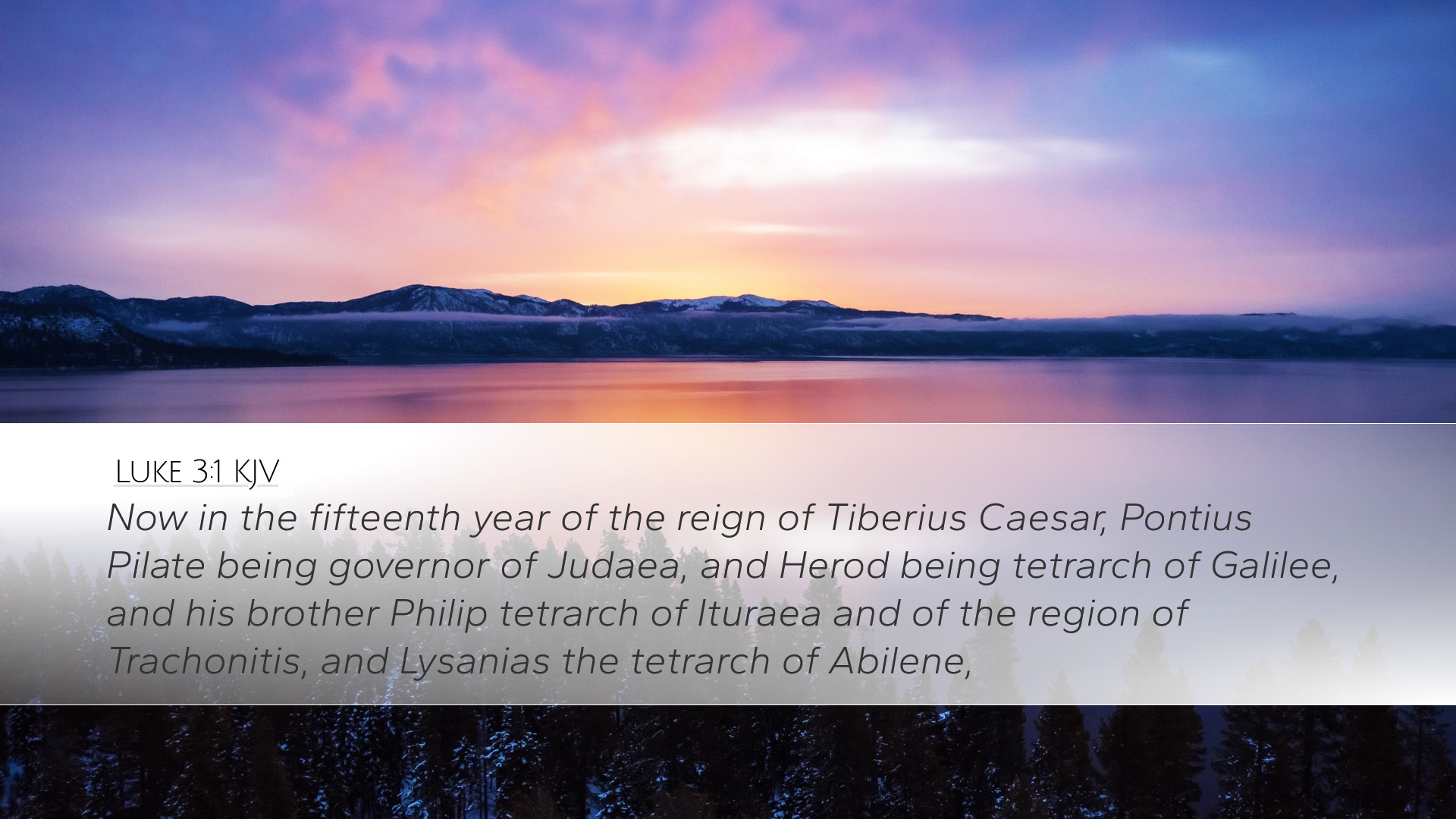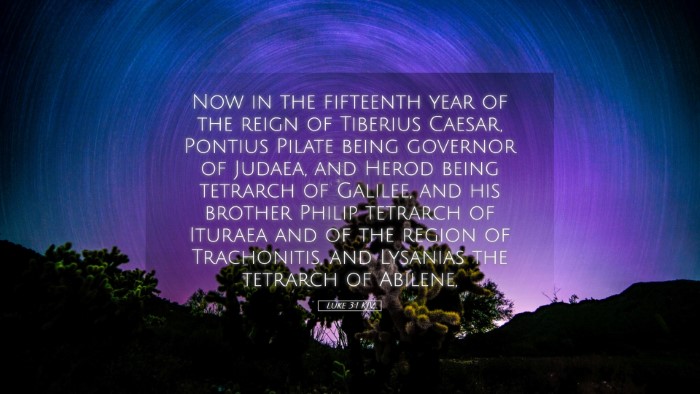Commentary on Luke 3:1
Text of the Verse: "Now in the fifteenth year of the reign of Tiberius Caesar, Pontius Pilate being governor of Judea, and Herod being tetrarch of Galilee, and his brother Philip tetrarch of Iturea and of the region of Trachonitis, and Lysanias the tetrarch of Abilene."
Introduction
Luke 3:1 serves as a crucial juncture in the Gospel, marking the transition from the narrative of Jesus' birth and early life to the beginning of His public ministry. It is situated within a specific historical context, enriched by names and political titles that ground the biblical account in real time and space. This commentary draws from the insights of notable scholars such as Matthew Henry, Albert Barnes, and Adam Clarke to examine the implications of this verse.
Historical Context
Luke precisely dates the beginning of John the Baptist's ministry, providing readers with a historical framework. The mention of Tiberius Caesar, the Roman emperor at that time, establishes the political backdrop and highlights the contrast between earthly authority and the divine message about to unfold.
- Tiberius Caesar: Reigned from A.D. 14 to A.D. 37, Tiberius was a figure of complex character, often seen as a tyrant. His rule encapsulates the oppressive atmosphere under which the early Christians lived.
- Pontius Pilate: As governor of Judea, he would later play a significant role in the trial and crucifixion of Jesus. His governorship (A.D. 26-36) marks a period of tension between Roman authority and Jewish governance.
- Herod Antipas: Tetrarch of Galilee, his rulership is marked by intrigue and moral failure. His connection with John the Baptist and later Jesus highlights the intersection of political and religious conflicts.
- Philip and Lysanias: These tetrarchs of Iturea and Abilene respectively, though less prominent, add to the understanding of regional governance and its impact on the narrative of the Gospels.
The Significance of the Inauguration of Ministry
This verse not only sets the time frame but also emphasizes the significance of John the Baptist's role as the forerunner to Christ. Luke's method of weaving together historical and spiritual elements fosters a deeper appreciation for the divine orchestration of events.
According to Matthew Henry, the mention of these historical figures is not merely for chronology but serves to establish the authority of John’s calling. His ministry, heralded in such a context, bears the weight and necessity of repentance and the coming kingdom, contrasting the moral decline represented by the rulers of the time.
Albert Barnes emphasizes that Luke's meticulous detailing serves a dual purpose: it not only affirms the veracity of the narrative but also serves as a call to recognize God’s intervention in history through prophetic fulfillment. This sets the stage for understanding Jesus’ ministry as the culmination of God's redemptive work.
The Prophetic Voice
John the Baptist’s appearance is marked by prophetic authority. Adam Clarke notes that the holy voice calling out in the wilderness is a fulfillment of the prophetic traditions outlined in the Old Testament, particularly Isaiah 40:3. John represents the last of the Old Testament prophets, bridging the gap to the New Covenant that Jesus would establish.
This anticipation of John’s ministry speaks to the nature of God’s engagement with humanity, as He raises voices that are not beholden to worldly power but serve His divine plan. Luke captures this by illustrating not just who is in power, but who speaks a transcendent truth to power.
Theological Implications
The opening verse of Luke 3 invites theological reflection on the nature of God’s kingdom in contrast to earthly kingdoms. The backdrop of political intrigue underscores the radical nature of the Gospel that emerges not from power but from humility and servanthood.
- The Nature of Repentance: John’s ministry centers on calling people to repentance, a theme that is vital for spiritual renewal. This concept is particularly significant for modern readers who seek restoration and transformation in the face of moral and societal decay.
- The Sovereignty of God: The temporal authority displayed through rulers serves to highlight God’s ultimate sovereignty. Despite the complex political landscape, God’s purposes prevail, inviting believers to trust in His unfailing plan.
- The Role of the Holy Spirit: In the broader narrative, the inclusion of the Holy Spirit’s movement through history prepares the church to recognize its dependence on divine empowerment to fulfill its mission.
Conclusion
Luke 3:1 not only marks a pivotal point in the Gospel narrative but invites deeper exploration into the historical, theological, and spiritual lessons that can be drawn from the lives of its figures. The way in which Luke presents this verse highlights the intricate relationship between God's sovereign plan and human history, calling the church to engage in the ongoing narrative of redemption.
This commentary aims to illuminate the richness of Scripture, encouraging pastors, students, theologians, and scholars to delve into the context and implications of this verse. May it inspire a greater understanding of John the Baptist's prophetic mission and the forthcoming revelation of Jesus Christ.


